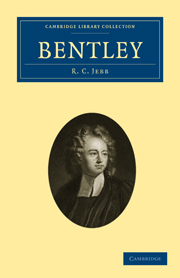Book contents
- Frontmatter
- PREFATORY NOTE
- Contents
- CHAPTER I EARLY LIFE. THE LETTER TO MILL
- CHAPTER II THE BOYLE LECTURES
- CHAPTER III LEARNED CORRESPONDENCE. THE KING'S LIBRARIAN
- CHAPTER IV THE CONTROVERSY ON THE LETTERS OF PHALARIS
- CHAPTER V BENTLEY'S DISSERTATION
- CHAPTER VI TRINITY COLLEGE, CAMBRIDGE
- CHAPTER VII BENTLEY AS MASTER OF TRINITY
- CHAPTER VIII LITERARY WORK AFTER 1700.—HORACE
- CHAPTER IX OTHER CLASSICAL STUDIES. — TERENCE. — MANILIUS. — HOMER
- CHAPTER X THE PROPOSED EDITION OF THE NEW TESTAMENT
- CHAPTER XI ENGLISH STYLE. EDITION OF PARADISE LOST
- CHAPTER XII DOMESTIC LIFE. LAST YEARS
- CHAPTER XIII BENTLEY'S PLACE IN THE HISTORY OF SCHOLARSHIP
CHAPTER XIII - BENTLEY'S PLACE IN THE HISTORY OF SCHOLARSHIP
Published online by Cambridge University Press: 07 September 2010
- Frontmatter
- PREFATORY NOTE
- Contents
- CHAPTER I EARLY LIFE. THE LETTER TO MILL
- CHAPTER II THE BOYLE LECTURES
- CHAPTER III LEARNED CORRESPONDENCE. THE KING'S LIBRARIAN
- CHAPTER IV THE CONTROVERSY ON THE LETTERS OF PHALARIS
- CHAPTER V BENTLEY'S DISSERTATION
- CHAPTER VI TRINITY COLLEGE, CAMBRIDGE
- CHAPTER VII BENTLEY AS MASTER OF TRINITY
- CHAPTER VIII LITERARY WORK AFTER 1700.—HORACE
- CHAPTER IX OTHER CLASSICAL STUDIES. — TERENCE. — MANILIUS. — HOMER
- CHAPTER X THE PROPOSED EDITION OF THE NEW TESTAMENT
- CHAPTER XI ENGLISH STYLE. EDITION OF PARADISE LOST
- CHAPTER XII DOMESTIC LIFE. LAST YEARS
- CHAPTER XIII BENTLEY'S PLACE IN THE HISTORY OF SCHOLARSHIP
Summary
It will not be the object of these concluding pages to weigh Bentley's merits against those of any individual scholar in past or present times. The attempt, in such a case; to construct an order of merit amuses the competitive instinct of mankind, and may be an interesting exercise of private judgment, but presupposes a common measure for claims which are often, by their nature, incommensurable. A more useful task is to consider the nature of Bentley's place in that development of scholarship which extends from the fifteenth century to our own day. Caution may be needed to avoid drawing lines of a delusive sharpness between periods of which the characteristics rather melt into each other. The fact remains, however, that general tendencies were successively prevalent in a course which can be traced. And Bentley stands in a well-marked relation both to those who preceded and to those who followed him.
At his birth in 1662 rather more than two centuries had elapsed since the beginning of the movement which was to restore ancient literature to the modern world. During the earlier of these two centuries—from about 1450 to 1550—the chief seat of the revival had been Italy, which thus retained by a new title that intellectual primacy of Europe which had seemed on the point of passing from the lands of the south. Latin literature engrossed tho early Italian scholars, who regarded themselves as literary heirs of Rome, restored to their rights after ages of dispossession. The beauty of classical form came as a surprise and a delight to these children of the middle age; they admired and enjoyed; they could not criticise.
- Type
- Chapter
- Information
- Bentley , pp. 206 - 224Publisher: Cambridge University PressPrint publication year: 2010First published in: 1882



